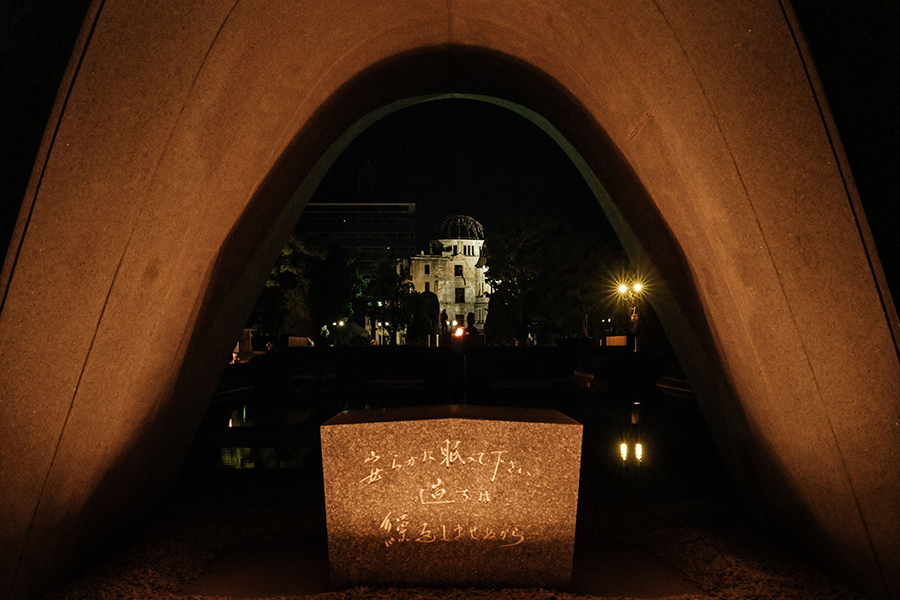“Right after I graduated, I interned with the Arms Control Association. It was terrific.”
Biden, G-7 Must Deliver on Disarmament at Hiroshima
March 2023
By Daryl G. Kimball
In the midst of Russian nuclear threats in its war on Ukraine and an accelerating global nuclear arms competition, U.S. President Joe Biden and other leaders of the Group of Seven (G-7) industrialized states will convene for their 2023 summit in Hiroshima, Japan.
 The May 19–21 gathering creates a crucial opportunity for Biden and his counterparts to recognize the horrors of nuclear war and reaffirm the goal of a world free of nuclear weapons while pledging concrete steps to halt the arms race, guard against nuclear weapons use, and advance nuclear disarmament. Anything less would be a failure of leadership at a time of nuclear peril.
The May 19–21 gathering creates a crucial opportunity for Biden and his counterparts to recognize the horrors of nuclear war and reaffirm the goal of a world free of nuclear weapons while pledging concrete steps to halt the arms race, guard against nuclear weapons use, and advance nuclear disarmament. Anything less would be a failure of leadership at a time of nuclear peril.
To his credit, Japanese Prime Minister Fumio Kishida chose Hiroshima, his home city, as the summit venue “to deepen discussions so that we can release a strong message toward realizing a world free of nuclear weapons.” In addition to the usual G-7 communique, Japan is proposing a separate joint statement on nuclear matters. Kishida told French President Emmanuel Macron in January that the leaders must “demonstrate a firm commitment to absolutely reject the threat or use of nuclear weapons.”
To do so, the G-7 statement should not only reaffirm that “a nuclear war cannot be won and must never be fought,” but also reiterate the powerful Nov. 16 statement by the Group of 20 countries that nuclear weapons use and threats of nuclear use are “inadmissible.” Agreement on such a statement may not be easy because all G-7 states, including host Japan, cling to nuclear deterrence strategies that depend on the threat of nuclear weapons use.
To be credible, the G-7 leaders also should pledge to follow through on their countries’ own, largely unrealized nuclear Nonproliferation Treaty (NPT) Article VI-related disarmament commitments, including to reduce the role, salience, and number of nuclear weapons. NPT obligations and commitments cannot be voided or delayed indefinitely.
In fact, pursuing disarmament is vital to preventing the international security environment from deteriorating further. With the last remaining Russian-U.S. nuclear arms control agreement expiring in 2026, the G-7 must urge the prompt resumption of talks to restore inspections under the New Strategic Arms Reduction Treaty and a new nuclear arms control framework.
To more effectively encourage China to exercise nuclear restraint, Biden and the rest of the G-7 should pledge not to support the development of new types of nuclear weapons, including U.S. sea-based nuclear-armed cruise missiles that Biden opposes but some U.S. and Japanese politicians claim are needed to counter China. Biden also should recognize China’s important role in strengthening the fragile nuclear order and invite President Xi Jinping to explore how the two nations can partner to address common nuclear nonproliferation challenges, including North Korea, and disarmament responsibilities.
In response to appeals from the mayors of Hiroshima and Nagasaki to engage their local communities to understand the reality of nuclear war, Japanese government sources say arrangements are being made for the G-7 leaders to visit the Hiroshima Peace Memorial Museum, which U.S. President Barack Obama toured in 2016.
Any U.S. presidential visit to Hiroshima is symbolically and politically important. Serious reflection and engagement with atomic bombing and testing survivors should be a job requirement for the leader of any nuclear-armed state. The G-7 would be smart to acknowledge the harm of the U.S. atomic bombings in 1945, as well as the environmental damage created by the nuclear weapons production and testing activities by all nuclear-weapon states, and to reaffirm their obligation to fully address these devastating impacts.
Biden, who pledged in 2020 to “restore American leadership on arms control and nonproliferation…and work to bring us closer to a world without nuclear weapons,” must provide even bolder leadership. In addition to supporting the strongest possible G-7 statement, joining other leaders at the museum, and laying a wreath in honor of those who perished from the atomic bombings, Biden should make a separate address in Hiroshima or Nagasaki outlining his own vision for a new global nuclear restraint and disarmament dialogue.
Biden could use such a speech to reiterate his invitation to Russian President Vladimir Putin to hold serious talks designed to maintain commonsense limits on or, ideally, further reduce Russian and U.S. nuclear stockpiles and to elaborate on why such an approach is essential for U.S., allied, and global security. Biden could remind other nuclear-armed states, particularly China, France, India, Pakistan, and the United Kingdom, that they need to be part of the solution and urge them to freeze the overall size of their nuclear weapons stockpiles as long as the United States and Russia continue to reduce theirs.
At a time of unprecedented nuclear danger, Japan’s decision to bring G-7 leaders to Hiroshima is an obvious yet bold choice. To be successful, Kishida and Biden must make the Hiroshima summit more than a symbolic backdrop. It must be a catalyst for bold, effective disarmament action to ensure that no country suffers the horrors of nuclear war ever again.
